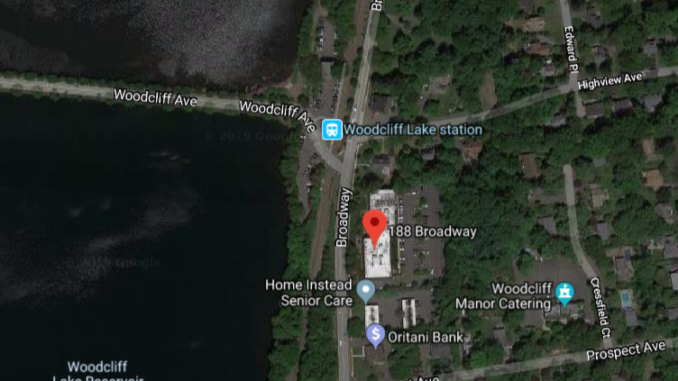
WOODCLIFF LAKE—After three hours of testimony July 20, on whether a legal principle that says a case cannot be judged again if it is substantially similar to one that was already decided, the Zoning Board voted unanimously to reject 188 Broadway LLP’s revised application to construct a 53-unit apartment complex at the 188 Broadway site.
The Zoning Board of Adjustment voted, 7–0, on a motion that the principle of res judicata — Latin for “the thing has been judged” — applied to the revised application even though it was reduced from 60 apartment units to 53 units, and a proposed second building on site was reduced from 3 stories to 2 1⁄2 , thus requiring one fewer variance. (See our story from July 5, 2021, for more.)
It also voted unanimously to approve a motion to dismiss the application because members did not believe circumstances had changed for the application as a result of the pandemic, as the applicant had asserted in a revised application letter.
“I think that concludes this matter,” said Board Attorney Salvatore Princiotto after the vote to dismiss the 188 Broadway LLP application.
“—For now,” put in Paul Kaufman, the applicant attorney, who’d challenged Princiotto’s presentation of witnesses and claimed he had not received certain documents that Princiotto brought into evidence.
Kaufman told Pascack Press on July 21, “We were hardly surprised by the vote, which was preordained and orchestrated by the board and its attorney, particularly after the board and its attorney would not permit us to question their witnesses, call any witnesses on this issue (including their own planner), accepted statements from (a) previous application taken out of context and prohibited us from submitting either the full statement or contrary statements.”
He added, “The applicant intends to pursue all of its rights and remedies.”
As in previous sessions on the matter, the application’s fourth hearing was held on Zoom, with two dozen virtual attendees watching as the two attorneys argued over witnesses and what lines of questioning were appropriate.
Both attorneys clashed with each other, despite an agreement not to talk over each other, over what should or should not be allowed.
At one point board chair Robin Malley had Kaufman’s microphone muted so that Princiotto could make a statement without being interrupted by Kaufman.
Kaufman objected to the muting and several times claimed that he was not able to mount the applicant’s case he wanted to due to Princiotto’s interference.
At one point, Kaufman called the proceedings “a kangaroo court.”
On a couple occasions, Malley defended Princiotto by stating that he represented the board’s interests and should question Kaufman’s statements and assertions as well as his witness cross-examinations when not relevant to the focus on whether res judicata applied to the revised application.
Princiotto noted that he has been emphasizing since the first revised application hearing that the Zoning Board would hear the application only to better understand whether the principle of res judicata applied.
He mentioned the issue often during each hearing, often provoking rebukes or objections from Kaufman.
The revised application still needed a use variance as it proposed to put a 53-unit, two-building apartment complex in a Special Office (S-O) Zone, plus four more variances and six additional site waivers, all unchanged from the previous 2019 application that was also rejected unanimously by the Zoning Board approximately two years ago.
Board member Christina Hembree, who accused Kaufman of giving her a stomach ache due to his “argumentativeness” following three-plus hours of verbal attacks and jousting with Princiotto, moved to dismiss the application, saying it was “very clear to me that it’s substantially similar to the original application.”
Member Dianna Cereijo said the applicant’s “blueprint is exactly the same” and that “the criteria has been met for res judicata as it’s substantially similar.”
Malley said the reduction of seven units and one less variance for a minor height reduction were “not a significant change to me.”
Member Lynda Picinic said after listening to professionals’ testimony, “In my mind, it’s substantially similar.”
Early in the meeting, borough planner Richard Preiss testified briefly on a February letter he wrote regarding whether res judicata applied to an earlier 2021 application for 60 units submitted by 188 Broadway LLP.
That application was submitted before the March 2021 application that reduced the proposal to 53 units with one fewer variance.
Preiss made no judgment on whether res judicata applied to the revised 53-unit application, noting he was not familiar with it and was only called to testify on his letter.
Preiss said there were five criteria that an application must meet before the board could vote to say the principle applied. He said the principle “does not allow a second bite at the apple” after a prior similar application has been denied.
Preiss said Zoning Board members are allowed to determine when an application is substantially similar or different from a prior application.
Preiss said the determination of what constitutes a substantially similar or substantially different application “is a gray area… there’s no black and white line that says, This is a substantial change.”
On July 23, 2019, the then Zoning Board rejected 188 Broadway LLP’s initial application for a two building, 60-unit apartment complex. An appeal was filed on Sept. 19. 2019 by then-applicant attorney James Delia. That appeal awaits a decision by Padovano.
